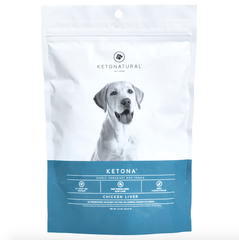Save Money, Save Your Dog.
Join Our Email List For Discounted Pricing and a Free Guide to the Science of Keto Dog Food.
The Difference Between "Reasons" and "Excuses" And Why Your Pup May Be Stuck In Between

We prove what we want to prove, and the real difficulty is to know what we want to prove.
- Emile Auguste Chartier
Why Not Today?[/caption]Is today the first time you've thought that your dog would be happier and healthier if she lost some weight?
Probably not.
If you've read this blog before (somewhat unlikely) or if you're at all interested in the intersection between doggie culture and science (more likely), you've probably heard that canine obesity is a serious problem in this country and you probably recognize that your dog's experience in the world would be measurably better if she were a fitter, healthier animal.
But chances are that, despite your awareness of this problem, you haven't taken any meaningful steps towards helping her become the fitter, healthier dog that she is capable of being:
** You haven't analyzed her current diet to determine what her caloric and nutritional needs are in light of her size, age, and activity level.
** You haven't purchased foods that can be used to meet her nutritional needs without filling her body with waste products, non-food, and substances that trigger unhealthy physiological responses such as fat retention and increased overall appetite.
** You haven't created and implemented a new dietary plan using your knowledge of her nutritional needs and your new food products.
** You haven't analyzed her age, physical abilities and limitations, behavioral tendencies (both innate and conditioned), and preferences to determine the healthy physical activities that are most enjoyable for her.
** You haven't formulated a new exercise plan by scheduling fun, calorie-burning "workouts" at appropriate intervals.
** And you haven't executed your new exercise plan by acting as your dog's play buddy-drill sargeant.
So why not?
Really, if you can admit that there's a problem that you know how to solve, then why haven't you begun working on it?
Take a moment here and listen to the narrative going on in your head. You're probably listing a bunch of phenomena, either real or perceived: "I'm too busy to take this on right now," "it's too cold and rainy where I live to workout with my dog outside," "my dog is happy enough just the way she is," "I'm too out-of-shape to do this with my dog," etc.
You probably slapped a label on the list that says "reasons."
Everybody calls these phenomena "reasons." When we get asked why we're not doing something we know we should be doing, we respond by identifying the "reasons" for our inaction. Of course, what we are calling "reasons" are usually just the circumstances outside of our immediate control to which we can logically attribute non-action.
Calling these phenomena the "reasons" for our inaction makes us feel good because it shifts responsibility to some unchangeable, external condition when that responsibility would otherwise fall largely on our own shoulders. This resolves the dissonance that otherwise exists when the life we are leading and the life we know we should be leading don't line up.
The problem, of course, is that these phenomena are not the real reasons for our inaction.
In reality, the reasons (the "causes") of inaction or any other event are infinitely numerous. They include things that were once within our control, others which we still can control, and still others that are truly external to us and outside of our control. You could spend many lifetimes just listing the multiplicity of reasons that you're reading this article right now.
The truth is that what we commonly call "reasons" are really just "excuses." Excuses are the phenomena to which we attribute an event in order to minimize the role which things within our control played in bringing about the event. Reasons are infinitely numerous, excuses are limited. Many reasons are or once were within our control, excuses are always somehow outside of our immediate control.
Excuses make us feel good because they shift painful, dissonance-inducing blame away from ourselves. They provide immediate relief from emotional pain.
But excuses are also toxic. They're a cheap fix to a very valid kind of pain. Feeling painful dissonance when you are not living the life you have logically chosen for yourself is a good thing. It's a reminder. An alarm. When you feel it buzzing, you know that you have gotten off-course.
Moreover, excuses prevent us from seeing a very useful truth -- that many of the causes for any one event were or are directly within our control. Admitting this is hard. But it's valuable. Because the sooner we develop comfort accepting blame for failing to accomplish our stated goals, the sooner we realize that the power to accomplish those goals lies squarely within our grasp. That kind of empowerment is the first step towards achievement.
Now, take another look at your mental list of "reasons." How many of them are really just focus-shifting "excuses"?
Dump those negative thoughts, start accepting some painful blame, and have a great Monday.
- Coach Dan

Related Articles
How Much Does The Farmer’s Dog Really Cost?
5 Signs and Symptoms That Your Dog May Have Diabetes
Learning to Take Pleasure In Being Your Dog's Play Buddy-Drill Sargeant
Dogs, Dog Food and Dogma - A Book About America's Pet Obesity Epidemic
Browse Articles By Category